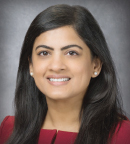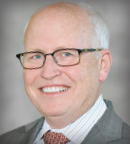Millions of Americans with cancer likely struggle to access some of the most advanced, state-of-the-art treatments being tested in clinical trials for their disease, according to a recent analysis from ASCO.
The 2023 State of Cancer Care in America Snapshot and corresponding manuscript found 70% of U.S. counties lack a single active cancer treatment trial, and 25% of adults older than age 55—the age group most diagnosed with the disease—would have to travel more than 2 hours round-trip to access a trial site with wide cancer offerings. Additionally, 90% of adult patients do not participate in clinical trials at all, and only half of all patients nationwide had access to a trial at their cancer care facility. The study is published in JCO Oncology Practice and accompanied by an infographic.

Ishwaria Subbiah, MD, MS
The challenge is especially profound for patients in rural areas, where only 10% of the nation’s oncologists practice. “We need to support bringing clinical trials to where the patients live and receive their care, as opposed to leaving them with no choice but to travel for a trial,” said Ishwaria Subbiah, MD, MS, Executive Director, Cancer Care Equity & Professional Wellness, Sarah Cannon Research Institute. “Clinical trials provide people with access to new, novel treatments. Yet, whether someone can access a potentially life-saving trial is often determined by where they live rather than if they’d be a good fit and could benefit. We need to bridge this divide and ensure more people with cancer can consider all the treatment choices available….”

David M. Waterhouse, MD, MPH
In addition to geographic disparities, the infographic also assesses the diversity of the oncology workforce; a critical element to reducing cancer care disparities. Presently, there are nearly 16,000 oncologists actively engaged in patient care in the United States. Of them, 50% are White, 30% are Asian, 5% are Hispanic or Latino, and 3% are Black. The workforce data also show that 36% of oncologists are women.
“This information highlights the need for increasing workforce diversity. A diverse workforce is more likely to increase cultural humility and the ability to deliver high-quality care to a broad patient population,” said David M. Waterhouse, MD, MPH, Director, Early Phase Clinical Trials, Oncology Hematology Care/Sarah Cannon Research Institute.
© American Society of Clinical Oncology. ASCO in Action. October 2, 2024. All rights reserved.

